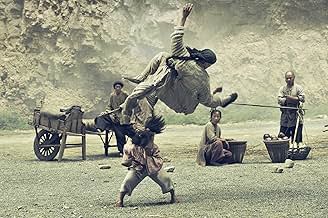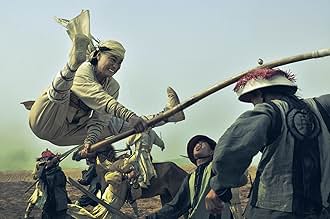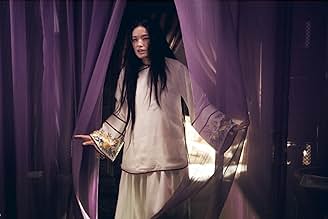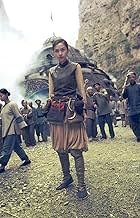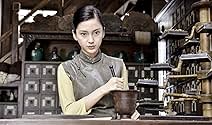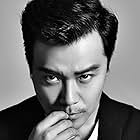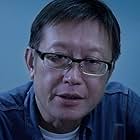IMDb RATING
6.0/10
5.3K
YOUR RATING
Yang travels to Chen Village to learn a powerful form of Tai Chi. Though villagers are forbidden from teaching outsiders, Yang becomes their best hope for survival when a man arrives with a ... Read allYang travels to Chen Village to learn a powerful form of Tai Chi. Though villagers are forbidden from teaching outsiders, Yang becomes their best hope for survival when a man arrives with a plan to build a railroad through the village.Yang travels to Chen Village to learn a powerful form of Tai Chi. Though villagers are forbidden from teaching outsiders, Yang becomes their best hope for survival when a man arrives with a plan to build a railroad through the village.
- Director
- Writers
- Stars
- Awards
- 8 nominations total
Fung Hak-On
- Lao Zhao
- (as Hark-On Fung)
Xiaochao Yuan
- The Freak
- (as Jayden Yuan)
Eddie Peng
- Fang Zi Jing
- (as Eddie Peng Yu-Yen)
Shaofeng Feng
- Chen Zai Yang
- (as Feng Shao Feng)
Stanley Sui-Fan Fung
- Grand Uncle
- (as Tsui-Fan Fung)
Sicheng Chen
- Chen Geng Yun
- (as Chen Si Cheng)
Xiong Xinxin
- Uncle Qin
- (as Xin Xin Xiong)
Wai Keung Lau
- Father Yang
- (as Andrew Lau Wai Keung)
- Director
- Writers
- All cast & crew
- Production, box office & more at IMDbPro
Featured reviews
The boy Yang Lu Chan (Jayden Yuan) was born with a little fleshy horn on his forehead and is called The Freak and is humiliated and rejected by the other boys in his village. However, when the horn is touched, he turns into an eminent kung fu warrior. When his beloved mother dies, he follows his Master Lao Zhao (Hark-On Fung) that is the leader of the Divine Truth army that fights the emperor army. However, every time that Yang fight, his horn gets darker and Master Dong (Siu-Lung Leung) tells that if it gets black, he will die. When the emperor army attacks the Divine Truth, Dong is deadly injured and he advises Yang to travel to the Chen Village to seek out Master Chen Chang Xing (Tony Leung Ka Fai) and learn the martial art Tai Chi that would provide energy to him to survive. However, the Master Chen is in a retreat and the Chen villagers refuse to teach the technique to outsiders. Yang meets Chen's daughter Chen Yu Niang (Angelababy) and she successively beats up on him trying to force Yang to give up. But a laborer suggests Yang to learn the Tai Chi movements while she beats him.
Meanwhile, Yu Niang's former boyfriend Fang Zi Jing (Eddie Peng), who was born in the village but has studied in Europe, returns to Chen Village expecting to convince the locals to allow building a railroad across their land. His proposal is rejected and he returns with the railroad representative Claire Heathrow (Mandy Lieu) in a lethal machine with British soldiers to destroy the Chen Village. Yang believes that if he becomes a hero saving the village, the locals will teach him Tai Chi.
"Tai Chi 0" is a funny adventure that uses the ancient Chinese tradition in the format of a video game. The good thing is that despite the difference of cultures, the story is highly entertaining and is worthwhile watching this movie. The bad thing is that the movie is to be continued. My vote is seven.
Title (Brazil): "O Mestre da Guerra" ("The Master of the War")
Meanwhile, Yu Niang's former boyfriend Fang Zi Jing (Eddie Peng), who was born in the village but has studied in Europe, returns to Chen Village expecting to convince the locals to allow building a railroad across their land. His proposal is rejected and he returns with the railroad representative Claire Heathrow (Mandy Lieu) in a lethal machine with British soldiers to destroy the Chen Village. Yang believes that if he becomes a hero saving the village, the locals will teach him Tai Chi.
"Tai Chi 0" is a funny adventure that uses the ancient Chinese tradition in the format of a video game. The good thing is that despite the difference of cultures, the story is highly entertaining and is worthwhile watching this movie. The bad thing is that the movie is to be continued. My vote is seven.
Title (Brazil): "O Mestre da Guerra" ("The Master of the War")
China is changing. Because film is a major force for shaping the national character, among the most interesting things these days, is watching the Chinese scramble to reinvent (post Mao) who they are and how they fit in the modern world.
Their newly-emerging documentary school chronicling the industrial rise of China is one aspect of this, and seems to have produced some pretty good pieces.
Their tried and tested practice though, meant both for internal consumption and abroad, is manufactured postcards of harmony (moral, spiritual), usually anchored in fabled history, usually in martial arts.
We saw that with the faddish promotion of qigong in the 90's, the Wong Fei Hung films and Zhang's Hero. We saw it again a few years ago with Yip Man. This juvenile mishmash is a tai chi showreel for the twitter generation reared on blockbuster steroids.
It is another 'origins' story of martial arts, that of Yang-style taijichuan. And because the filmmaker probably felt that to his teenage audience the mid-1800's would seem like forever ago, he goes crazy on myth and movie nonsense, but careful not to upset state officials.
This leads to a pretty boneheaded product. Once more, Chinese 'purity' is contrasted with encroaching Western civilization. Westerners standing in for capitalism and technology are portrayed as evil and corrupting, while the actual film is made by copying what is currently trending in the capitalist blockbuster market.
The steampunk revisionism of a huge metallic beast threatening the old way of life is from Wild Wild West. The notion of a small community where everyone is a martial arts expert is from Kung Fu Hustle (and of course the story of Chen Jia Gou). The obvious video game humor is from Scott Pilgrim. The wire-fu is Sammo Hung's and a longtime staple of cinematic wushu via HK. The speed-ramps of the opening battle are from 300, with other perspectives borrowed from Scott and recent John Woo.
This is all echoed inside the film as the young boxer learning taijichuan by imitating the moves.
As someone who practices in the Yang-style, I advise you to steer clear of this. It has no sincerity or soul. What is of some interest, is noting the irony of this film in the current climate of aggressively expansive Chinese capitalism. Or how the Kung Fu Panda franchise is widely celebrated there.
Meanwhile, Chinese martial arts have gone from their original mix and match roots of outlaw boxing, to collective standardization in the communist years, to government-promoted sport, to exhibition and health therapy. Having proved inadequate in the modern mixed martial arts world, the current move is away from the forced harmony of (usually fabricated) tradition and towards the practical cross-training system of sanda/sanshou, which in turn emulates several foreign styles.
Their newly-emerging documentary school chronicling the industrial rise of China is one aspect of this, and seems to have produced some pretty good pieces.
Their tried and tested practice though, meant both for internal consumption and abroad, is manufactured postcards of harmony (moral, spiritual), usually anchored in fabled history, usually in martial arts.
We saw that with the faddish promotion of qigong in the 90's, the Wong Fei Hung films and Zhang's Hero. We saw it again a few years ago with Yip Man. This juvenile mishmash is a tai chi showreel for the twitter generation reared on blockbuster steroids.
It is another 'origins' story of martial arts, that of Yang-style taijichuan. And because the filmmaker probably felt that to his teenage audience the mid-1800's would seem like forever ago, he goes crazy on myth and movie nonsense, but careful not to upset state officials.
This leads to a pretty boneheaded product. Once more, Chinese 'purity' is contrasted with encroaching Western civilization. Westerners standing in for capitalism and technology are portrayed as evil and corrupting, while the actual film is made by copying what is currently trending in the capitalist blockbuster market.
The steampunk revisionism of a huge metallic beast threatening the old way of life is from Wild Wild West. The notion of a small community where everyone is a martial arts expert is from Kung Fu Hustle (and of course the story of Chen Jia Gou). The obvious video game humor is from Scott Pilgrim. The wire-fu is Sammo Hung's and a longtime staple of cinematic wushu via HK. The speed-ramps of the opening battle are from 300, with other perspectives borrowed from Scott and recent John Woo.
This is all echoed inside the film as the young boxer learning taijichuan by imitating the moves.
As someone who practices in the Yang-style, I advise you to steer clear of this. It has no sincerity or soul. What is of some interest, is noting the irony of this film in the current climate of aggressively expansive Chinese capitalism. Or how the Kung Fu Panda franchise is widely celebrated there.
Meanwhile, Chinese martial arts have gone from their original mix and match roots of outlaw boxing, to collective standardization in the communist years, to government-promoted sport, to exhibition and health therapy. Having proved inadequate in the modern mixed martial arts world, the current move is away from the forced harmony of (usually fabricated) tradition and towards the practical cross-training system of sanda/sanshou, which in turn emulates several foreign styles.
This is an exploration into the tropes of Gung Fu movies. Every single line, every move, is taking apart kung fu cinema. I have waited for a parody like this for years, and I mean all the way from Rudy Ray Moore's Shaolin Dolemite to Kung Pow: Enter the Fist. They all missed the point. This is a Tarantino film without Tarantino beating you to death with it. A movie for true kung fu fans only. It is barely accessible to outside audiences, which I think explains the negative reviews.
How does the master know how to do that? EXACTLY! Why does he gain skills for no reason? EXACTLY. It is dissecting the clichés and also telling a story.
Plus, Shu Qi is in it, and that's always a plus.
How does the master know how to do that? EXACTLY! Why does he gain skills for no reason? EXACTLY. It is dissecting the clichés and also telling a story.
Plus, Shu Qi is in it, and that's always a plus.
I always love a good kung fu movie. Black Belt Theater was one of the things that inspired me to train in martial arts and become a stuntman. Of course being a stuntman means I get my butt kicked by the star 99% of the time I am on film, but hey it's a paycheck for doing something I love. I have been working in stunts for about seven years now and have done everything from music videos and commercials to low budget indies and big budget blockbusters. I perform and also coordinate and choreograph fights so I tend to watch action films very carefully and spot any flaws or miscues pretty easily during fight scenes. I figure my kung fu fanboy persona is balanced by my professional stuntie persona, making me a good candidate to give an honest review.
The film is written by Kuo-fu Chen who really hasn't written many kung fu movies, and has only written nine films total, but more on that later. Directing is Stephen Fung, an actor who I really like that has also directed a few good films including "House of Fury" and "Jump", the latter working with Stephen Chow of Shaolin Soccer and Kung Fu Hustle fame, which is obviously where he tried to go with Tai Chi Zero.
When I first saw the trailer for Tai Chi Zero it looked like another period piece kung fu movie where the hero is a dopey loser until he unlocks his inner kung fu genius, and for the most part it is. Mix in some slapstick comedy, and slick graphic elements along with performances from some old school kung fu legends and it seems like a recipe for success a la Kung Fu Hustle. Also add that the hero of the film is real life 2008 Wushu Champion Yuan Xiaochao with fights choreographed by Sammo Hung and that should ensure some great action sequences. And for the most part it does deliver on the action.
Where TC0 falls short, for me, is in the writing. And in fairness maybe I should reserve judgment until I see the sequel, Tai Chi Hero, because the film feels incomplete. It really felt like I only watched half of a movie. Yes it was very entertaining and enjoyable, but the characters lacked development and most of the story relied on the clichés of "Western influence bad, Chinese tradition good", and as mentioned above "dopey loser must unlock potential". And those themes work well when developed and executed properly, but here they seemed rushed. Again it seems like they were going for Kung Fu Hustle, and they succeeded in the visual aspects, but Stephen Chow is also a tremendous writer and storyteller and it is pretty apparent that Kuo-fu Chen has some learning to do before he reaches Chow's level. Again, maybe I need to see Hero before making final judgment.
The acting is good for the most part, considering the limited character depth. Tony Leung and Angelababy carry the film while newcomer Yuan Xiaochao plays the dopey loser role well enough. The action sequences are entertaining, but Xiaochao doesn't really get to strut his stuff, hopefully the sequel will showcase this man's true skills. There is comedy and cool video game overlays sprinkled in to add some flavor, as well as a few animated sequences to add some more "new school" style.
Overall it seems like all the ingredients were there for success, but the writing just wasn't up to par for a really engaging storyline. It was hard to feel emotional attachment to many of the characters because little time was spent developing them and building a bond with the audience. It all felt rushed leaving the actors and director little to work with substance wise.
I still recommend seeing the film because it is a fun ride. The story centers on the Chen village where Chen style Tai Chi originates and, historically correct, outsiders from the Chen family were forbidden to learn. The hero travels there and gets his butt kicked around a bit, then the evil British foreigners come to build a railroad and he helps defend the village. The end comes abruptly but really leaves you wanting to see the sequel, which is a good thing.
My 10 year old son really enjoyed it; he loves video games, and cartoons, kung fu and a good laugh so it was right up his alley. My kung fu Sifu found it to be a bit too slapstick and style over substance, but did acknowledge the Tai Chi was authentic. I found myself right in the middle; I really did enjoy the look and feel of the film, but it just fell short in the story and character department. Hopefully the sequel ties it all together. Fortunately Tai Chi Hero opens in January so I won't be waiting long to see how it turns out.
I am giving it 8 stars on the strength that the sequel brings it all home. If this was viewed as standalone I would prob be more in the 6 range.
The film is written by Kuo-fu Chen who really hasn't written many kung fu movies, and has only written nine films total, but more on that later. Directing is Stephen Fung, an actor who I really like that has also directed a few good films including "House of Fury" and "Jump", the latter working with Stephen Chow of Shaolin Soccer and Kung Fu Hustle fame, which is obviously where he tried to go with Tai Chi Zero.
When I first saw the trailer for Tai Chi Zero it looked like another period piece kung fu movie where the hero is a dopey loser until he unlocks his inner kung fu genius, and for the most part it is. Mix in some slapstick comedy, and slick graphic elements along with performances from some old school kung fu legends and it seems like a recipe for success a la Kung Fu Hustle. Also add that the hero of the film is real life 2008 Wushu Champion Yuan Xiaochao with fights choreographed by Sammo Hung and that should ensure some great action sequences. And for the most part it does deliver on the action.
Where TC0 falls short, for me, is in the writing. And in fairness maybe I should reserve judgment until I see the sequel, Tai Chi Hero, because the film feels incomplete. It really felt like I only watched half of a movie. Yes it was very entertaining and enjoyable, but the characters lacked development and most of the story relied on the clichés of "Western influence bad, Chinese tradition good", and as mentioned above "dopey loser must unlock potential". And those themes work well when developed and executed properly, but here they seemed rushed. Again it seems like they were going for Kung Fu Hustle, and they succeeded in the visual aspects, but Stephen Chow is also a tremendous writer and storyteller and it is pretty apparent that Kuo-fu Chen has some learning to do before he reaches Chow's level. Again, maybe I need to see Hero before making final judgment.
The acting is good for the most part, considering the limited character depth. Tony Leung and Angelababy carry the film while newcomer Yuan Xiaochao plays the dopey loser role well enough. The action sequences are entertaining, but Xiaochao doesn't really get to strut his stuff, hopefully the sequel will showcase this man's true skills. There is comedy and cool video game overlays sprinkled in to add some flavor, as well as a few animated sequences to add some more "new school" style.
Overall it seems like all the ingredients were there for success, but the writing just wasn't up to par for a really engaging storyline. It was hard to feel emotional attachment to many of the characters because little time was spent developing them and building a bond with the audience. It all felt rushed leaving the actors and director little to work with substance wise.
I still recommend seeing the film because it is a fun ride. The story centers on the Chen village where Chen style Tai Chi originates and, historically correct, outsiders from the Chen family were forbidden to learn. The hero travels there and gets his butt kicked around a bit, then the evil British foreigners come to build a railroad and he helps defend the village. The end comes abruptly but really leaves you wanting to see the sequel, which is a good thing.
My 10 year old son really enjoyed it; he loves video games, and cartoons, kung fu and a good laugh so it was right up his alley. My kung fu Sifu found it to be a bit too slapstick and style over substance, but did acknowledge the Tai Chi was authentic. I found myself right in the middle; I really did enjoy the look and feel of the film, but it just fell short in the story and character department. Hopefully the sequel ties it all together. Fortunately Tai Chi Hero opens in January so I won't be waiting long to see how it turns out.
I am giving it 8 stars on the strength that the sequel brings it all home. If this was viewed as standalone I would prob be more in the 6 range.
The above just about sums it up: if you dig the film's sense of humour, you'll enjoy it so much more. Alas, most western viewers probably won't, so will brand its uniqueness simply as a "mess".
To be fair, this is a very "seen it all before" story, but with warp-speed cuts, great use of SFX, above par wire-fu and superb cinematography, the flick is elevated way beyond its humble plot. I think that when film fans talk about "vision", they mean something like what the director managed to convey on screen in this very film.
So, what's it all about?
A kid with the mark of a born kung fu legend is exploited into fighting for a cult, until a doctor warns how such violence will lead to his death and that he needs to learn the passive art of tai chi in order to live a happy life... as opposed to plain dying. Naturally then, our somewhat dim-witted lead ventures off to Chen village to learn, only to be constantly turned away, as the art isn't taught to outsiders. And on it goes...
With eye-candy galore, this film truly caters for men! I mean: a fast-paced kung fu flick full of gorgeous women? Yep, Tai Chi Zero ticks all the boxes, but again, it's that sense of humour that'll make or break the film for you, and for me, despite all its positives, there was only so much enjoyment from this that I could get.
It seems obvious, but I'll nutshell anyway: others will call Tai Chi Zero "dumb" or "awesome", but the only real way to determine if you'll enjoy this film for yourself, is to watch it.
To be fair, this is a very "seen it all before" story, but with warp-speed cuts, great use of SFX, above par wire-fu and superb cinematography, the flick is elevated way beyond its humble plot. I think that when film fans talk about "vision", they mean something like what the director managed to convey on screen in this very film.
So, what's it all about?
A kid with the mark of a born kung fu legend is exploited into fighting for a cult, until a doctor warns how such violence will lead to his death and that he needs to learn the passive art of tai chi in order to live a happy life... as opposed to plain dying. Naturally then, our somewhat dim-witted lead ventures off to Chen village to learn, only to be constantly turned away, as the art isn't taught to outsiders. And on it goes...
With eye-candy galore, this film truly caters for men! I mean: a fast-paced kung fu flick full of gorgeous women? Yep, Tai Chi Zero ticks all the boxes, but again, it's that sense of humour that'll make or break the film for you, and for me, despite all its positives, there was only so much enjoyment from this that I could get.
It seems obvious, but I'll nutshell anyway: others will call Tai Chi Zero "dumb" or "awesome", but the only real way to determine if you'll enjoy this film for yourself, is to watch it.
Storyline
Did you know
- ConnectionsFeatured in WatchMojo: Top 10 Best Steam Punk Movies (2017)
- SoundtracksSymphony No. 9 in E minor Op. 95 'From the New World'
Written by Antonín Dvorák
Performed by The New World Symphony Orchestra
- How long is Tai Chi Zero?Powered by Alexa
Details
- Release date
- Country of origin
- Languages
- Also known as
- Tai ji 1: Cong ling kai shi
- Production companies
- See more company credits at IMDbPro
Box office
- Gross US & Canada
- $212,094
- Opening weekend US & Canada
- $85,094
- Oct 21, 2012
- Gross worldwide
- $1,317,376
- Runtime1 hour 38 minutes
- Color
- Sound mix
- Aspect ratio
- 2.35 : 1
Contribute to this page
Suggest an edit or add missing content




